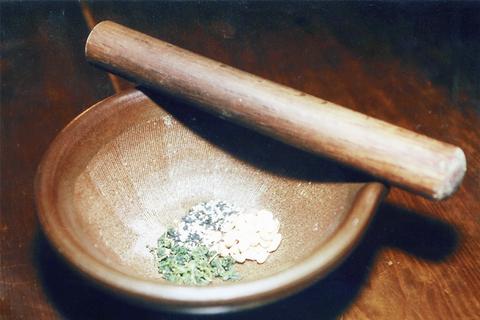If you're tired of many restaurants' superfluous service, Ah-Chih Lei Cha offers a unique chance to serve yourself by letting you make your own tea.
Lei cha, or pounded tea, is a traditional Hakka beverage. Legend has it that during China's Three Kingdoms era, when General Chang Fei (張飛) led his troops into the then capital Chengdu and was about to capture it, a plague broke out among his men. An old doctor prescribed a tea brewed from pounded sesame seeds, peanuts, tea leaves and fruit kernels. It cured all the ill soldiers and was handed down from generation to generation.
Lei cha was later used in traditional tea ceremonies to welcome guests. "If you visit a Hakka house and they let you pound your own lei cha, that means they respect you," said Chiu De-chih (邱得治) or Ah-chih (阿治), co-owner of the restaurant.

PHOTO: DAVID VAN DER VEEN, TAIPEI TIMES
At present, Ah-Chih Lei Cha is the only place in Taipei that serves the traditional drink.
A Hakka himself, Chiu tried to combine his long-time dream of running a coffee shop and his ambition to introduce people to Hakka culture. The Hakkas' characteristic perseverance and work ethic are manifested in the making of lei cha, which involves a lot of pounding. The finer the ingredients are pounded, the better the tea tastes. The concoction tastes refreshing and is nutritious and rich in fiber to boot.
Ah-Chih Lei Cha's dishes are mostly defined by their strong flavors.
"The Hakkas endured a lot of hardship in history. Often there wasn't enough [money] for dishes -- only rice to eat. So the dishes were made heartier to go with more rice," said Su Chang-wei (蘇章瑋), who also owns a stake in the restaurant.
Spicy tofu pork chunks (NT$250) may repel some people with its excess of fat. But its preparation -- first frying the meat, then stewing it in spicy tofu for an hour and serving with lemon grass -- rid it of the greasy taste. Also, the process leaves the pork with an intriguing taste of tofu and is not spicy at all.
The relaxing restaurant also offers a variety of Hakka desserts to choose from, including sweet lei cha masu and salty turnip cakes. They go well with the pomelo tea that combines dried pomelo processed with Chinese herbs to create a smooth taste and delightful fragrance.
At present, the restaurant is offering several kinds of set meals with special prices in celebration of its second anniversary.

The canonical shot of an East Asian city is a night skyline studded with towering apartment and office buildings, bright with neon and plastic signage, a landscape of energy and modernity. Another classic image is the same city seen from above, in which identical apartment towers march across the city, spilling out over nearby geography, like stylized soldiers colonizing new territory in a board game. Densely populated dynamic conurbations of money, technological innovation and convenience, it is hard to see the cities of East Asia as what they truly are: necropolises. Why is this? The East Asian development model, with

June 16 to June 22 The following flyer appeared on the streets of Hsinchu on June 12, 1895: “Taipei has already fallen to the Japanese barbarians, who have brought great misery to our land and people. We heard that the Japanese occupiers will tax our gardens, our houses, our bodies, and even our chickens, dogs, cows and pigs. They wear their hair wild, carve their teeth, tattoo their foreheads, wear strange clothes and speak a strange language. How can we be ruled by such people?” Posted by civilian militia leader Wu Tang-hsing (吳湯興), it was a call to arms to retake

This is a deeply unsettling period in Taiwan. Uncertainties are everywhere while everyone waits for a small army of other shoes to drop on nearly every front. During challenging times, interesting political changes can happen, yet all three major political parties are beset with scandals, strife and self-inflicted wounds. As the ruling party, the Democratic Progressive Party (DPP) is held accountable for not only the challenges to the party, but also the nation. Taiwan is geopolitically and economically under threat. Domestically, the administration is under siege by the opposition-controlled legislature and growing discontent with what opponents characterize as arrogant, autocratic

When Lisa, 20, laces into her ultra-high heels for her shift at a strip club in Ukraine’s Kharkiv, she knows that aside from dancing, she will have to comfort traumatized soldiers. Since Russia’s 2022 invasion, exhausted troops are the main clientele of the Flash Dancers club in the center of the northeastern city, just 20 kilometers from Russian forces. For some customers, it provides an “escape” from the war, said Valerya Zavatska — a 25-year-old law graduate who runs the club with her mother, an ex-dancer. But many are not there just for the show. They “want to talk about what hurts,” she